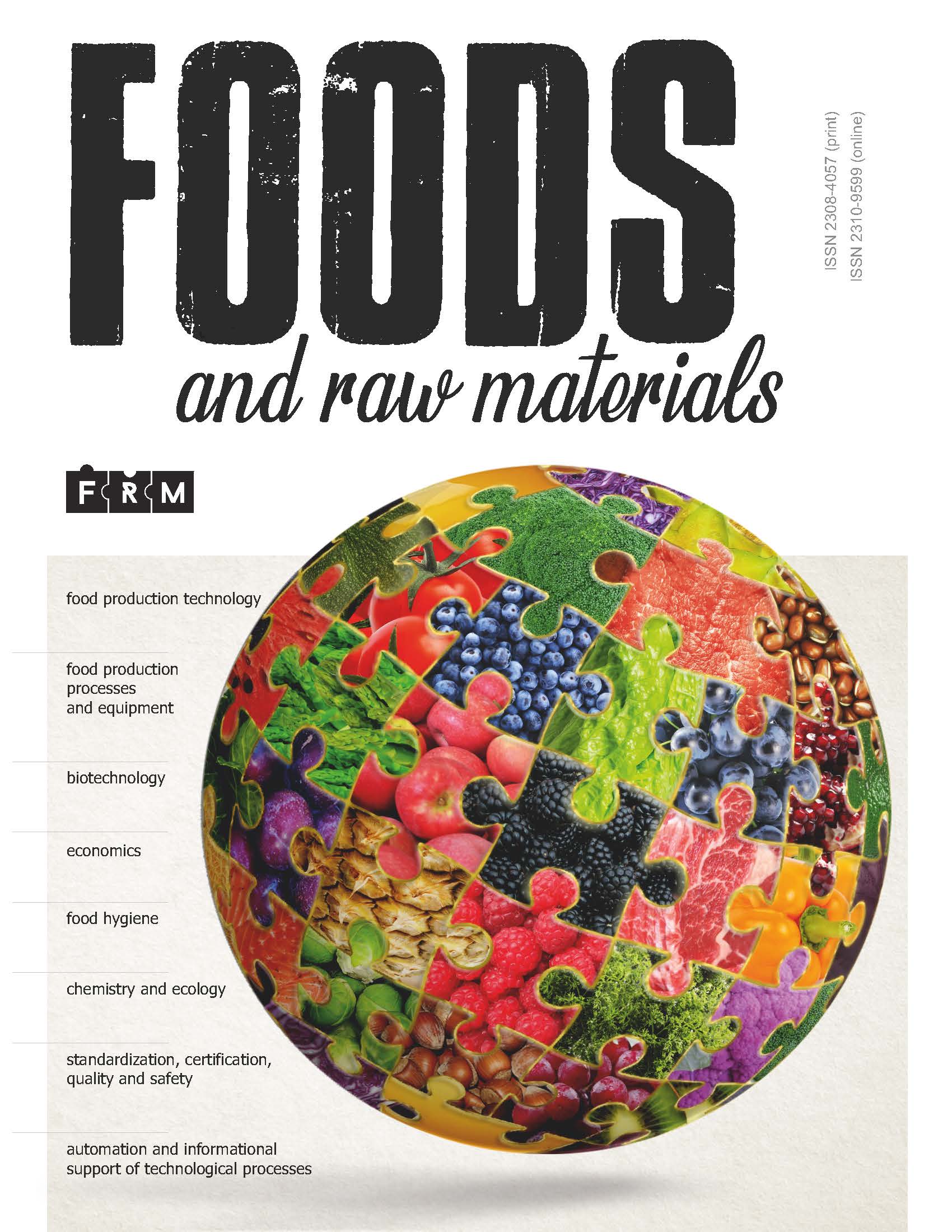The growing demand of the Russian population for healthy food dictates the need in functional ingredients production increase. Inulin, the polysaccharide of natural origin, has a wide range of functional activity. This article grounds the expedience of inulin obtaining from Jerusalem artichoke tubers and considers effective technological methods of ensuring high yield and quality of the target product. It was demonstrated that application of vibration with frequency 24 Hz for 60 min at temperature 30–35°C intensifies the extraction process, and fractionation of the extract on membranes with pore diameter 2, 3 and 5 kDa allows to obtain inulin with certain physicochemical properties. The membrane separation results in three inulin fractions: low molecular (DP = 2-10), medium molecular (DP = 11-18) and high molecular (DP = 19-35) fraction. The medium molecular fraction of inulin, which is used as prebiotic and fat substitute in food technology, was studied using FTIR spectroscopy and 1H-13C NMR spectrometry. The obtained spectral characteristics have led to a conclusion that the investigated sample of inulin is highly competitive with the best world analogues. The authors thoroughly describe the method of determining the degree of polymerization and average molecular weight of the investigated polysaccharide using 1H-13C NMR spectroscopy. It has been established that inulin obtained by improved technology has the degree of polymerization DP = 13–14 and molecular weight 2124–2286 Da. The results of this work have practical value for production of inulin from Jerusalem artichoke tubers and theoretical value for the chemistry of natural compounds.
Functional ingredients, Jerusalem artichoke, inulin, degree of polymerization, FTIR, NMR spectroscopy
1. Roberfroid M.B. Inulin - type fructans: functional food ingredients. J. Nutr., 2007, vol. 137, no. 11, pp. 2493-2502.
2. Nazarenko M.N., Barkhatova T.V., Kozhukhova M.A., Khripko I.A. and Burlakova E.V. Inulin changes in Jerusalem artichoke tubers during storage. Scientific Journal of KubSAU, 2013, vol. 10, no. 94. Available at: http://ej.kubagro.ru/2013/10/pdf/17.pdf. (accessed 14 September 2015). (In Russian).
3. Ladnova O.L. and Merkulova E.G. Application of inulin and stevia for development of new generation products. Advances in Current Natural Sciences, 2008, no. 2, pp. 46-47. Available at: www.rae.ru/use/?section= content&op=show_article&article_ id=7778866. (accessed 14 September 2015). (In Russian).
4. Kochnev N.K. and Kamenecheva M.V. Jerusalem artichoke-bioenergy culture of the XXI century. Moscow: Ares Publ., 2002. 76 p. (In Russian).
5. Molochnikov V.V., Orlova T.A. and Suyunchev O.A. Processing dairy raw materials using polysaccharides according to “Bio-Ton” technology. Food Industry, 1996, no. 5, pp. 34-35. (In Russian).
6. Perkovets M.V. Inulin and oligofructose-universal functional ingredients. Oils&Fats, 2008, no. 5, pp. 2-4. (In Russian).
7. Fedorenchenko L.A. and Tuzhilkin V.I. Method of determining the fractional composition of carbohydrate complex of inulin-containing raw materials. Storage and Processing of Farm Products, 1999, no. 12, pp. 24. (In Russian).
8. Yuta V.I. Inulin as the ingredient for soft drinks. Beer and Beverages, 2000, no. 6, pp. 24. (In Russian).
9. Koryachkina S.Ya. and Bajbasheva D.K. Influence of the degree of polymerization of inulin and oligofructose molecules on their residual content in rye-wheat malt bread with functional purpose. Transactions of Higher Educational Institutions, Food Technology, 2010, no. 1, pp. 28-30. (In Russian).
10. Anisimov S.V., Grishina A.S. and Papina M.V. Kefir - tasty, healthy, therapeutic product from "Stavropolsky" dairy factory. Dairy Industry, 2009, no. 7, pp. 75. (In Russian).
11. Yatsenko A.A., Kornienko A.V. and Zhuzhalova T.P. Root chicory. Voronezh: VNISS, "Istoki" press, 2002. 135 p. (In Russian).
12. Sheremetova S.G., Gasanova E.S., Ponomarev A.N., Sheremetova S.G., Kotov V.V., Polyanskiy K.K. and Nenokhov D.V. Use of stevia and yacon extracts and syrups in fermented milk products. Food Industry, 2007, no. 11, pp. 73. (In Russian).
13. Dzantieva L.B., Tsugkieva V.B. and Tsugkiev B.G. Nutrients of Jerusalem artichoke tubers. Zemledeliye, 2006, no. 4, pp. 33. (In Russian).
14. Zelenkov V.N. and Shahin S.S. Many faces of Jerusalem artichoke in past and present. Novosibirsk: Concern "OIT" - NTF "ARIS", SB RAMS Publ., 2000. 241 p. (In Russian).
15. Polyansky K.K., Rodionova N.S. and Glagoleva L.E. Jerusalem artichoke: prospects for use in dairy industry. Voronezh: VGU Press Publ., 1999. 104 p. (In Russian).
16. Bagautdinova R.I. and Fedoseeva G.P. Productivity and fractional composition of carbohydrate complex from Jerusalem artichoke cultivars with different precocity. Agricultural Biology, 2000, no. 1, pp. 55-63. (In Russian).
17. Dzantieva L.B., Tsugkieva V.B. and Tsugkiev B.G. Nutrient content in the green mass of Jerusalem artichoke cultivar "Interes". Kormoproizvodstvo, 2006, no. 6, pp. 27-29. (In Russian).
18. Nazarenko M.N., Barkhatova T.V., Kozhukhova M.A., Khristyuk V.T. and Babenkova M.A. Intensification of inulin extraction from Jerusalem artichoke tubers using vibration. Scientific Journal of KubSAU, 2013, vol. 10, no. 94. Available at: http://ej.kubagro. ru/2013/10/pdf/18.pdf. (accessed 14 September 2015). (In Russian).
19. Perov A.G., Kosachev V.S. and Koshevoy E.P. Modeling of working schedule of extraction production with specialized units. News of Institutes of Higher education. Food Technology, 2008, no. 5-6, pp. 55-58. (In Russian).
20. Sergienko M.A., Khristyuk V.T. and Uzun L.N. Intensification of brewing industry processes. Storage and Processing of Farm Products, 2008, no. 8, pp. 24-25.
21. Tkachenko R.N. and Khristyuk V.T. Influence of vibration of pure yeast culture on kinetics of wort fermentation and chemical composition of wine. Transactions of Higher Educational Institutions, Food Technology, 2009, no. 5-6, pp. 50-52. (In Russian).
22. Abou-Arab A.A., Talaat H.A. and Abu-Salem F.M. Physico-chemical properties of inulin produced from Jerusalem artichoke tubers on bench and pilot plant scale. Australian Journal of Basic and Applied Sciences, 2011, vol. 5, no. 5, pp. 1297-1309.
23. Xue B.L., Wen J.L., Sun S.L., Xue B.L. and Sun R.C. Recent advances in characterization of lignin polymer by solution-state nuclear magnetic resonance (NMR) methodology. Materials, 2013, vol. 6, no. 1, pp. 359-391. Available at: http://www.mdpi.com/ journal/materials. (accessed 14 September 2015).
24. Coudray C., Demigné C. and Rayssiguier Y. Effects of inulin-type fructans of different chain length and type of branching on intestinal absorption and balance of calcium and magnesium in rats. Eur. J. Nutr., 2003, vol. 42, no. 2, pp. 91-98.










